The saree is deeply entrenched in India’s fashion history and plays a major role in its heritage. These nine yards of elegance vary from state to state in India. Each has its own charm, craftsmanship, and style. Let’s check out the different types of sarees in India that add up grace to the Indian Heritage.
The History Of Sarees In India
The saree has been around for more than 6000 years. It is believed to have evolved from a three-piece garment consisting of unstitched pieces of cloth draped as a lower garment, a chest band, and a piece worn over one’s shoulder or head. The saree later became that one stretch of cloth that did all this at once. Skillfully pleated at the waist to make it convenient to walk, the saree thus became an integral part of Indian history.
Here are the different types of sarees found across India.
Different Types of Sarees
1. Assam Silk Saree
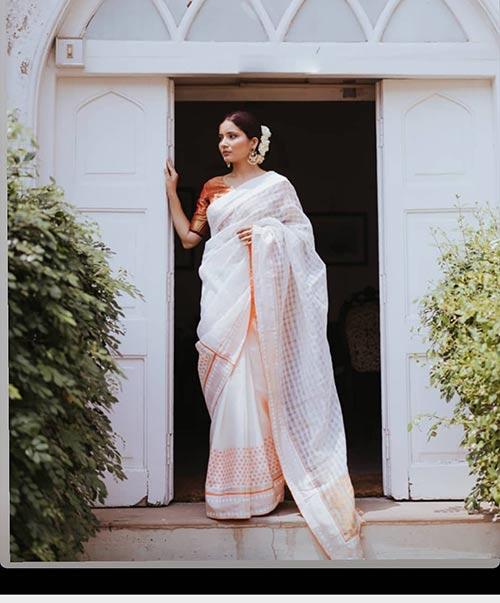
vilaasinie / Instagram
Assam silk sarees are crafted with silk obtained from the domesticated multivoltine silkworm, Antiheroes assamensis. There are three major types of Assam wild silks – Golden Muga silk, White Pat silk, and Eri silk.
Material: Silk
Originally from: Sualkuchi
Attire from: Assam
2. Banarasi Silk Saree
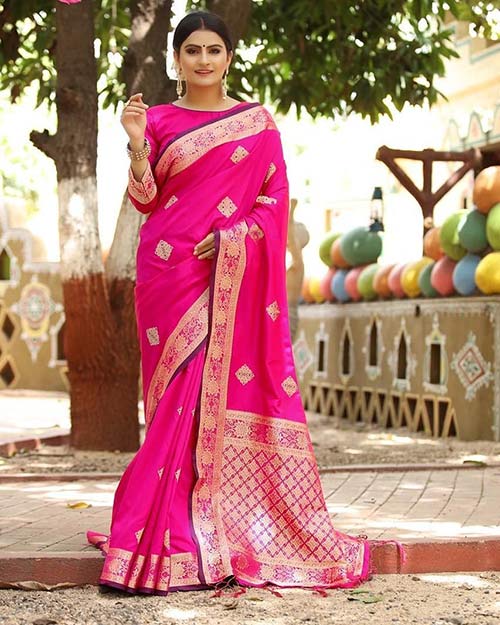
_the_wardrobe_store / Instagram
Banarasi sarees are made in the beautiful city of Varanasi, which is also known as Benaras or Banaras. These sarees are known for their richness and grandeur. With their magnificent embroidery done with gold and silver zari on fine silk, they are a must-have in your wardrobe.
Material: Silk
Originally from: Varanasi, Azamgarh, Jaunpur, Bhadohi, Chandauli, and Mirzapur
Attire from: Uttar Pradesh
3. Chanderi Saree
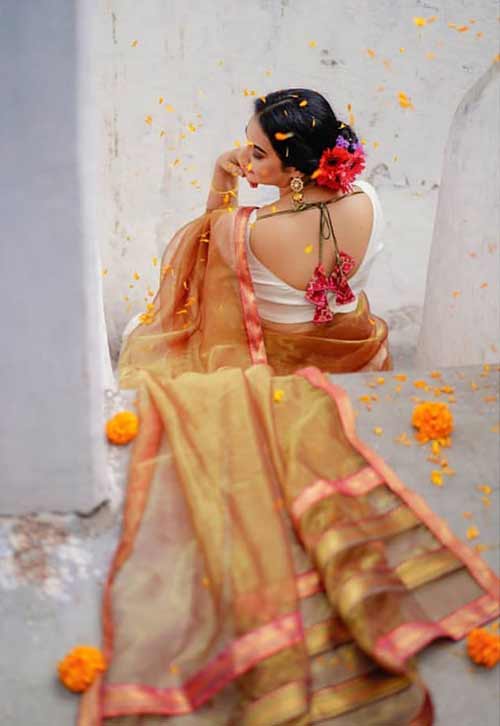
mogra_weaves / Instagram
Chanderi sarees are produced in pure silk, Chanderi cotton, and silk cotton. These saris are of the finest quality and known for their gold and silver zari, fine silk, and earthy richness.
Material: Silk and cotton
Originally from: Chanderi, Malwa, and Bundelkhand
Attire from: Madhya Pradesh
4. Sambalpuri Saree
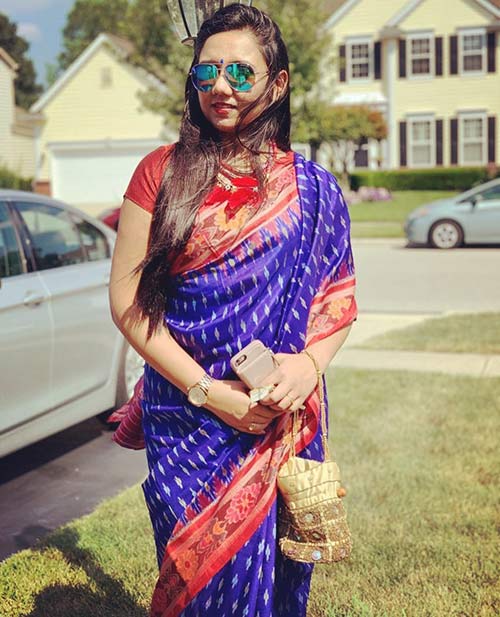
nicky_iger / Instagram
Sambalpuri sarees are hand-woven ikat sarees created with the tie-dye method. They are renowned for their geometric patterns and motifs likeshanka (shell), chakra (wheel), and flowers.
Material: Cotton, silk, and mercerization cotton
Originally from: Sambalpur, Bargarh, Sonepur, Brahmapur, Balangir, and Boudh
Attire from: Odisha
5. Kasta Saree
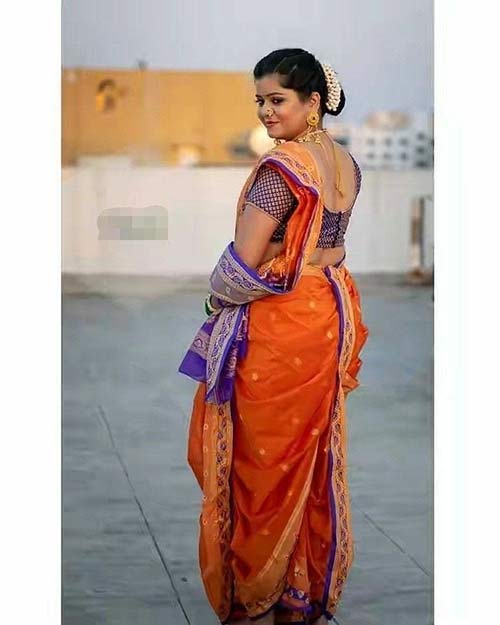
marathi_shaan / Instagram
Kasta or Kaashthasarees are the traditional nine-yard Maharashtrian sarees that are known for their draping style. They are draped in a dhoti-style known as Navvari, which means ‘nine-yards.’
Material: Cotton and silk
Originally from: Pune, Nashik, and Mumbai
Attire from: Maharashtra
6. Chiffon Saree
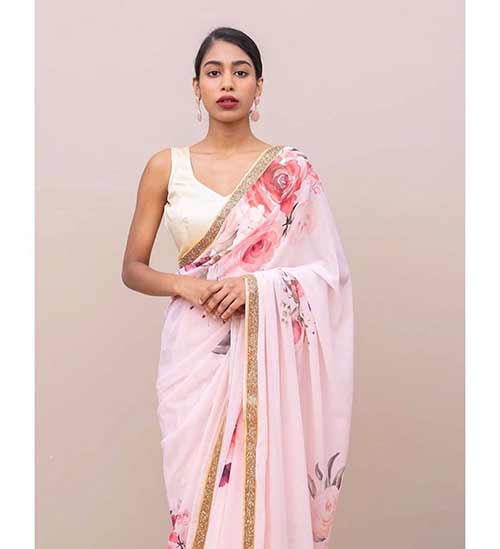
mogra_weaves / Instagram
The chiffon fabric can be traced way back to the 1700s in Europe. Even though this fabric is not originally from India, chiffon sarees have been all the rage for a long time now as they are frequently worn by actresses in Bollywood movies.
Material: Silk fiber, nylon, and polyester
Originally from: France
Attire from: Europe
7. Georgette Saree
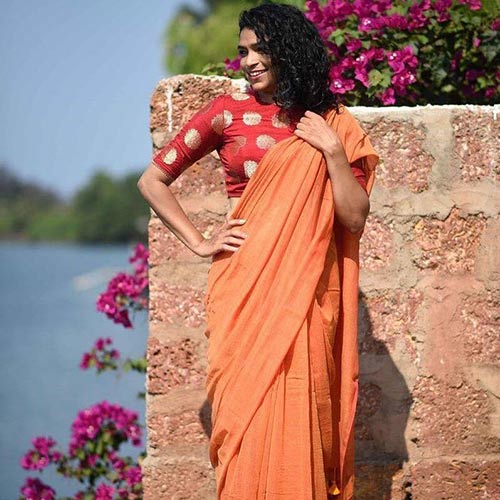
unicorncloset_womenstore / Instagram
Georgette is a sheer, lightweight, dull-finished crêpe fabric. It is distantly related to chiffon, except it is a little more crinkly and known for its adaptive and easy-wearing abilities.
Material: Rayon, polyester, viscose, and nylon
Originally from: France
Attire from: France
8. Kosa Saree
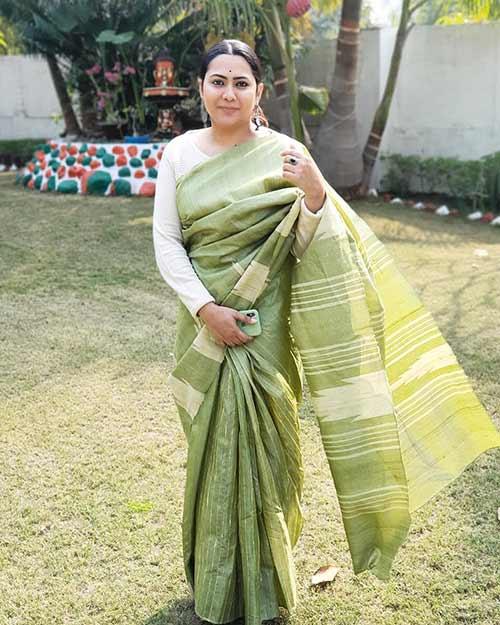
sorted_in_saree / Instagram
Kosa silk is obtained from the Indian silkworm and is a variety of Tussar silk. It is known for its sturdiness and is preferred over pure silk in Chhattisgarh. This silk is naturally dyed with the palaas flower, the red pollen of the rora flower, the dark rose-red from lac, and other natural colors.
Material: Silk, cotton, and polyester
Originally from: Korba and Champa
Attire from: Chhattisgarh
9. Net Saree
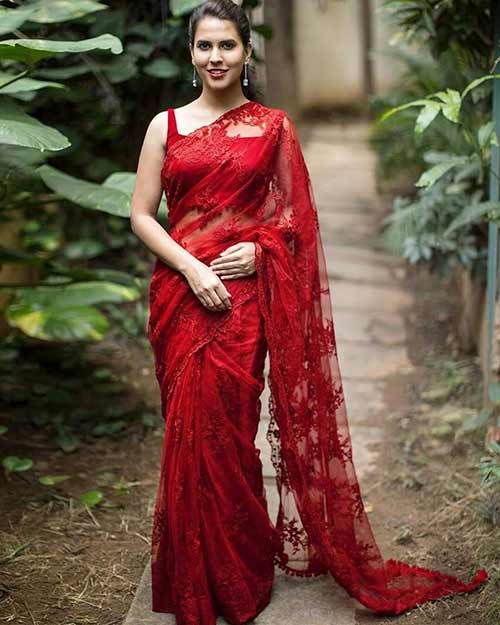
unique_womens_collections / Instagram
Net sarees started trending a few years ago, but the net fabric has been in use for hundreds of years now. The origin of this fabric remains unclear, but it has been traced back to ancient India as well as western civilizations. It was initially used for wedding gowns and skirts and later upgraded to sarees.
Material: Cotton, artificial polyamides, nylon, and silk
Originally from: Mughal era
10. Bandhani Saree

mogra_weaves / Instagram
Bandhani or Bandhej sarees have a unique charm of their own. Made with the tie-dye method, the bandhani saree is usually found in bright and vibrant colors. It is usually dyed by hand and with natural colors.
Material: Silk, cotton, cotton silk, chiffon, and georgette
Originally from: Ahmedabad, Kutchh, Saurashtra, Rajasthan, and some parts of Uttar Pradesh
Attire from: Gujarat
11. Kasavu Saree
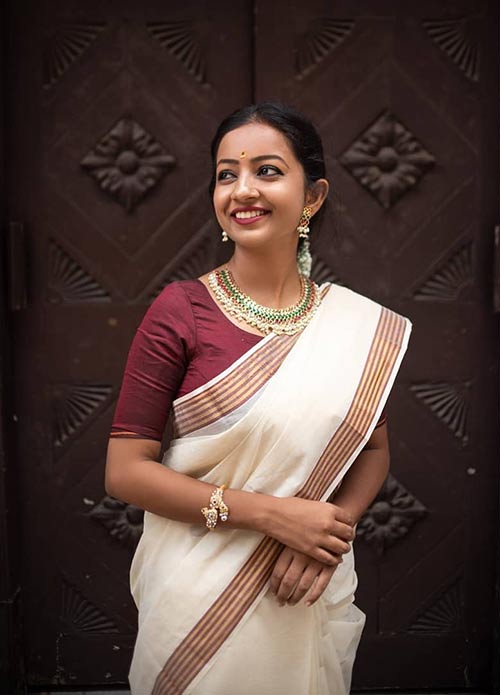
sayonee_d / Instagram
Kasavu sarees (also known as Kerala sarees) are renowned for their minimalistic beauty. The base color varies from off-white to beige, and the border has a solid color and golden zari design. Majorly worn for Onam festival, the Kerala saree is now famous worldwide.
Material: Silk, cotton, and chiffon
Originally from: Kuthampully and Mysore
Attire from: Kerala
12. Patola Saree
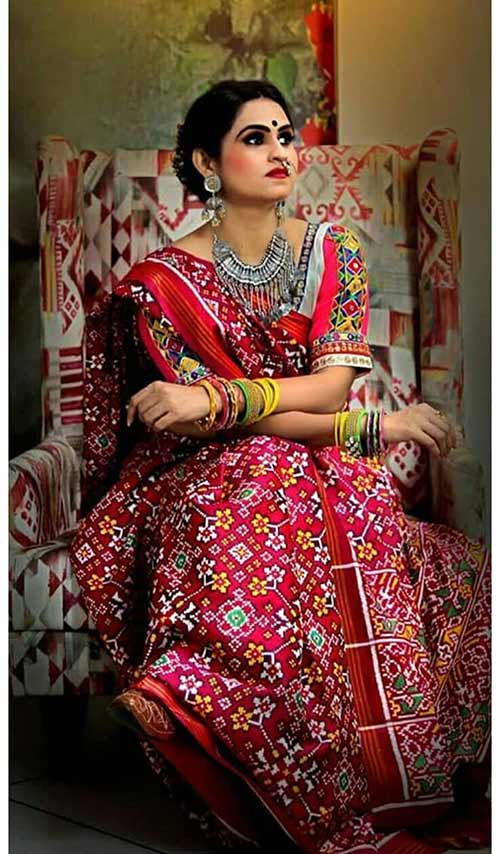
xx_official_patola.com_xx / Instagram
Patola sarees are the double ikat patterned sarees that are made in Gujarat. It takes about four to six months to weave a single Patola saree, which makes it extremely expensive.
Material: Silk
Originally from: Patan,Lalitpur
Attire from: Gujarat
13. Kanjeevaram Saree
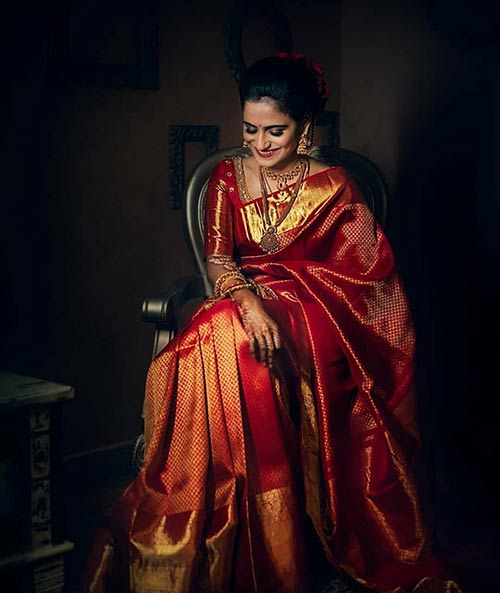
silksofindia / Instagram
Kanjeevaram or Kanchipuram is the finest silk in India. Kanjeevaram sarees are the patent bridal wear in South India as they are rich, regal and filled with gorgeous zari work.
Material: Silk
Originally from: Kanchipuram
Attire from: Tamil Nadu
14. Kalamkari Saree
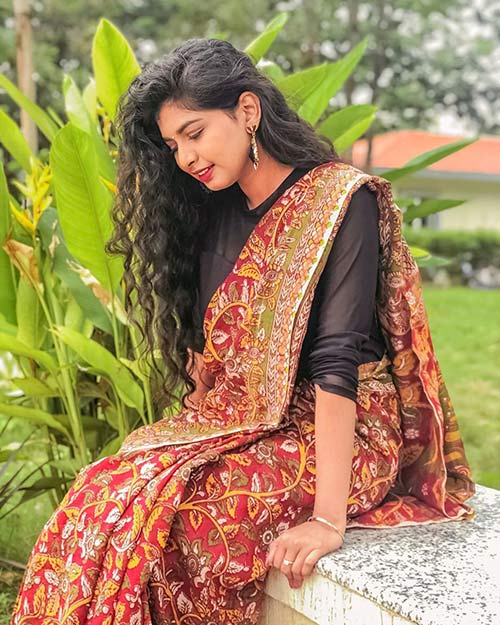
thesmalltowngirl / Instagram
Kalamkari sarees are magnificent hand-painted sarees made in Andhra Pradesh. Kalamkari art is done on cotton or silk with a tamarind pen and natural color dyes. The word kalamkari is derived from the Persian word kalam (meaning ‘pen’) and kari(meaning skill).
Material: Silk and cotton
Originally from: Telangana
Attire from: Andhra Pradesh
15. Paithani Sarees
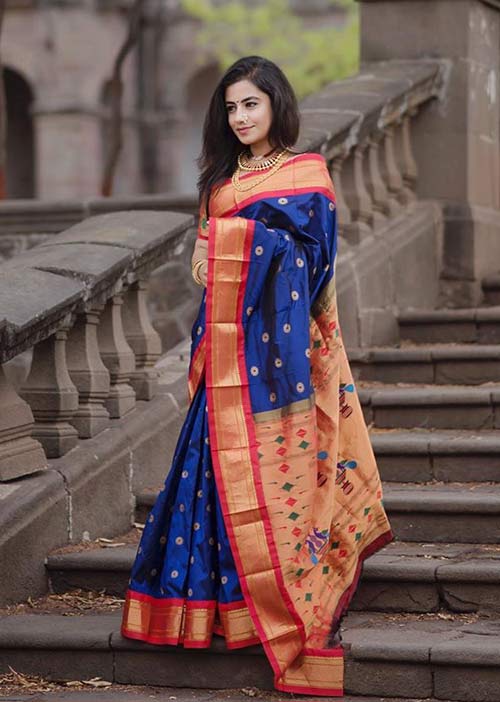
kautuka / Instagram
The splendid Paithani saree from Maharashtra is known for its golden zari richness and peacock motifs all over the pallu. Paithani sarees are available in kaleidoscopic colors (Dhoop-Chaav shades) that add grandeur to the attire.
Material: Silk
Originally from: Paithan
Attire from: Maharashtra
16. Muga Saree
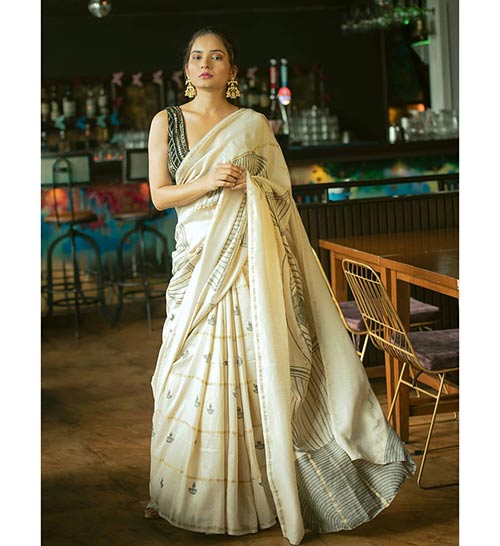
saree_art / Instagram
The Muga saree is a variation of Assam silk saree. It is produced only in Assam and nowhere else. Muga is traditionally used to make an attire called Mehelka Sadar – a traditional Assamese saree.
Material: Silk
Originally from: Sualkuchi, Guwahati
Attire from: Assam
17. Puttapaka Saree
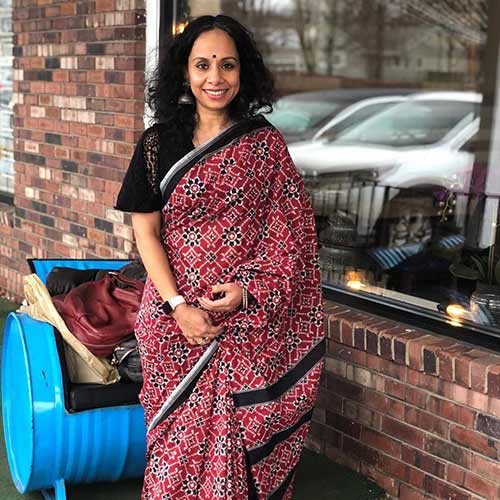
tarangweaves / Instagram
Puttapaka sarees are a more detailed and close-knitted version of ikat sarees. With more intricate geometric weaving, Puttapaka sarees have a stunning symmetry without undermining its aesthetic.
Material: Silk and puttapaka cotton
Originally from: Nalgonda
Attire from: Telangana
18. Phulkari Sarees
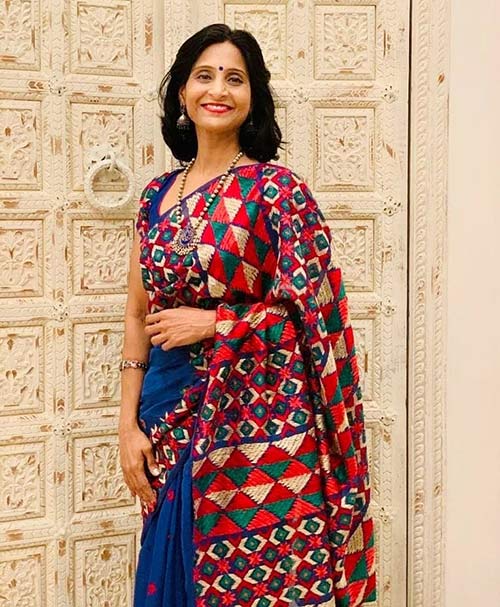
champa_qali_designs / Instagram
Phulkari literally translates to ‘flower work’ and it originated from Punjab.Phulkari sarees are worn by women in Punjab during weddings, festivals, and other celebrations. With its vibrant colors and uniform floral patterns, the embroidery of Phulkari sarees is a treat for the eyes.
Material: Silk and cotton
Originally from: Peshawar, Jhelum, Amritsar, Jalandhar, Ambala, and Ludhiana
Attire from: Punjab
19. Bhagalpuri Sarees
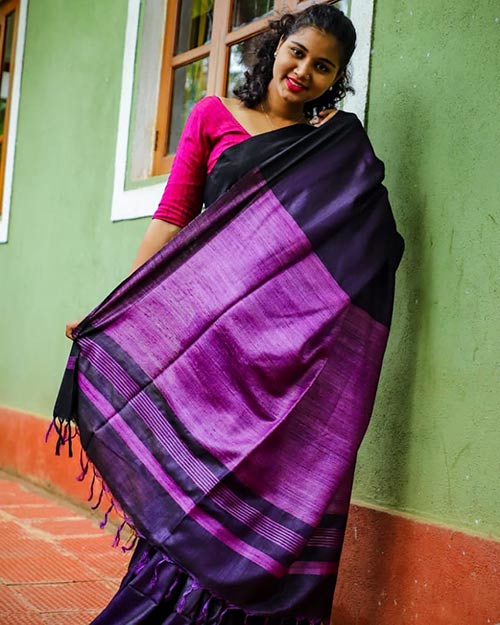
the_room_of_weaves / Instagram
Bhagalpuri sarees are known for their unique and striking fine silk. The silk is naturally dyed with vegetable colors and acid dyes that add to the charm of the saree. The simplicity of the saree makes sure it stands out in a crowd.
Material: Silk
Originally from: Bhagalpur
Attire from: Bihar
20. Bomkai Sarees
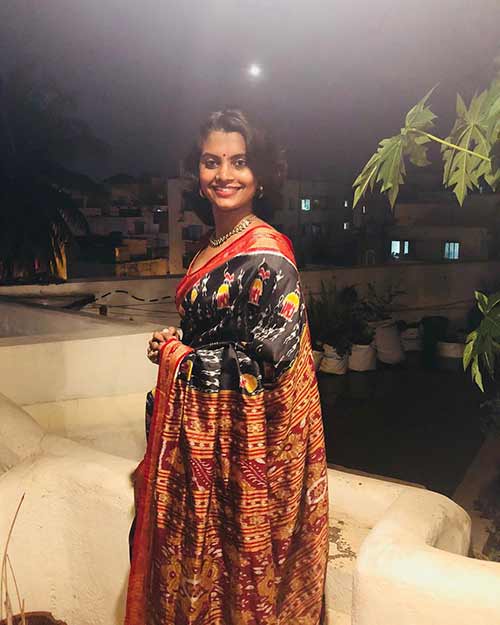
drama.rani / Instagram
Bomkai sarees are produced in Odisha. Bomkai (also known as Sonepuri ) is an extraordinary fabric in silk and cotton, which is woven on a pit loom. The borders are usually done in contrasting colors and the pallu is filled with intricate threadwork.
Material: Silk and cotton
Originally from: Bomkai, Subarnapur
Attire from: Odisha
21. Dhakai Saree
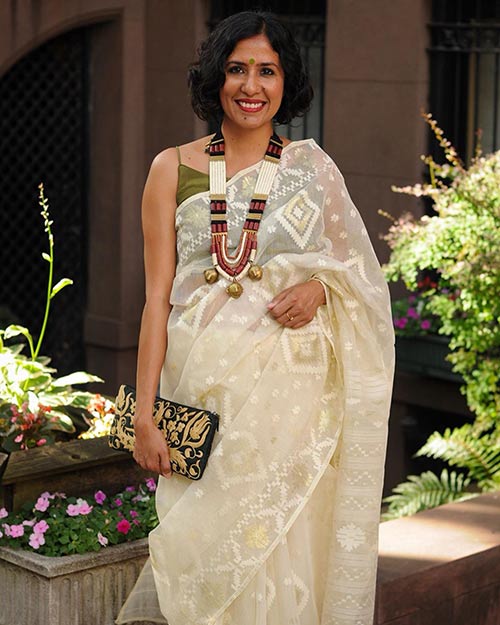
seemaskt / Instagram
The dhakai saree is most commonly known as Dhaka-Jamdhani. This saree has multiple designs and motifs, each signifying various things like growth, fertility, and marital bliss.
Material: Cotton
Originally from: Dhaka
Attire from: Bangladesh
22. Pochampally Saree
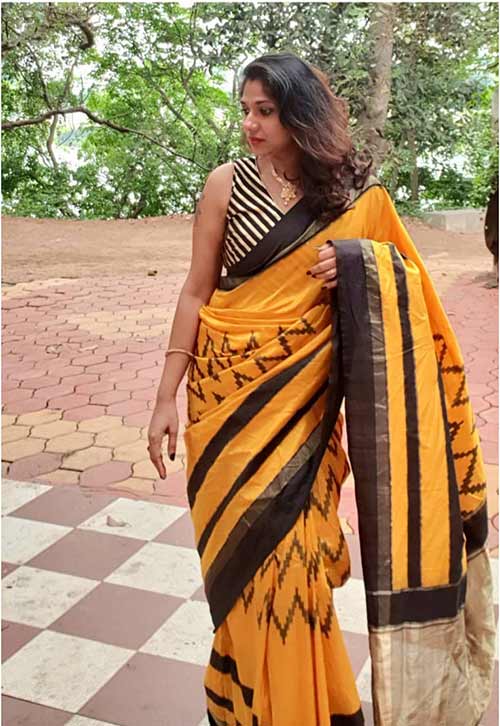
thedrapediva / Instagram
Pochampally sarees are the origin of the ikat style. The vibrant colors and unusual color combinations of Pochampally sarees make them extremely trendy and suitable for all age groups.
Material: Silk, cotton, and cotton silk
Originally from: Bhoodan Pochampally, Nalgonda, Telangana
Attire from: Andhra Pradesh
23. Gadwal Saree
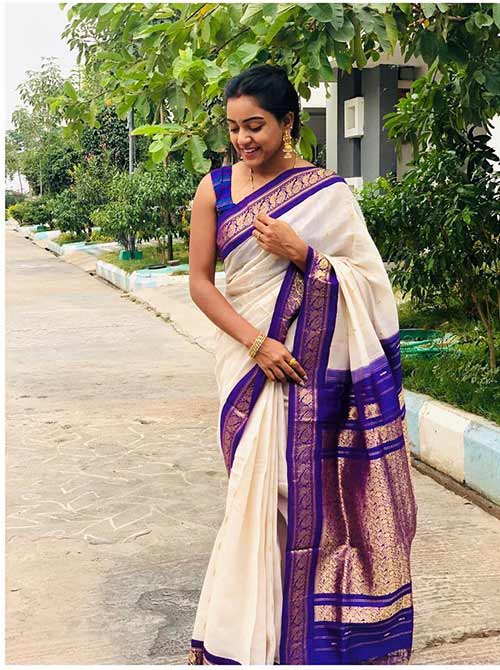
vithikasheru / Instagram
Highly noted for their vibrant zari, Gadwal sarees are a must-have in your wardrobe! The base of this saree is cotton while the border is crafted with silk and zari. The designs on these sarees are inspired by the regional temples and architecture, and you can notice some beautiful and exotic shapes decorating the borders and body.
Material: Silk and cotton
Originally from: Mahbubnagar, Uppadda
Attire from: Telangana
24. Konrad Saree
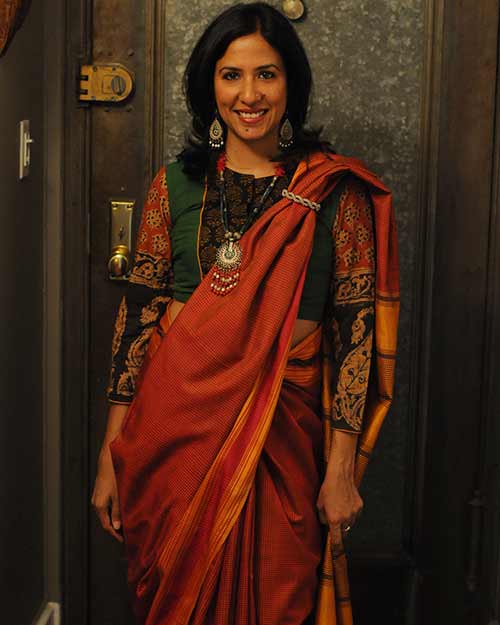
seemaskt / Instagram
Konrad (Koorainadu) sarees were originally woven for temple deities. The design of this saree is usually filled with checks or strips, and it is woven in fine silk. Another specialty of Konrad silk is that it is light-weight and easy to carry.
Material: Silk and cotton
Originally from: Koorainadu, Chennai
Attire from: Tamil Nadu
25. Ilkal Saree
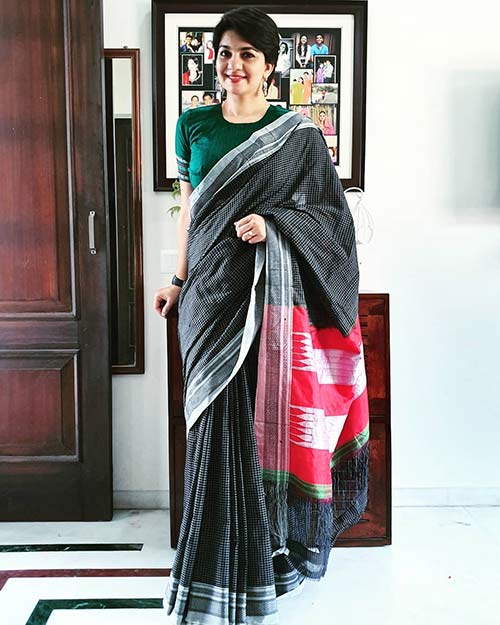
amarjyotchahal / Instagram
Ilkal sarees are woven using cotton warp for the body and art silk warp for the border and pallu. Be it checked, striped, or plain – Ilkal sarees look simple but are rich in texture.
Material: Silk and cotton
Originally from: Ikal, Bagalkot
Attire from: Karnataka
26. Chikankari Saree
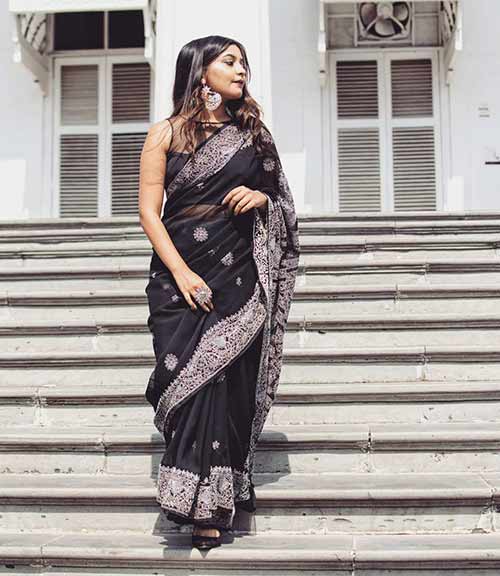
oorja.revivestyle / Instagram
Chikankari sarees are delicate and artfully hand-embroidered. Traditionally, white thread used to the embroidered on pastel-colored sarees. The French knots and stitches are used to fill the embroidery designs.
Material: Cotton, georgette, silk, organza, and muslin
Originally from: Lucknow
Attire from: Uttar Pradesh
27. Mangalgiri Saree
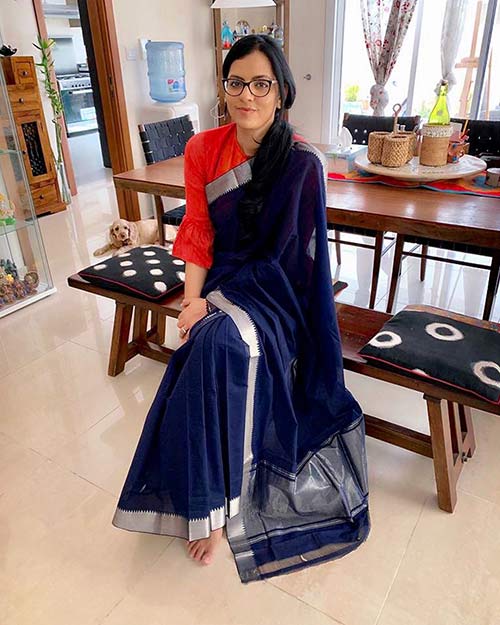
g3vinod / Instagram
Mangalgiri sarees are plain with golden, silver, or colorful zari designs on the border. This saree looks simple but has a rich zari border and pallu and is easy to maintain.
Material: Cotton
Originally from: Mangalgiri, Chittoor
Attire from: Andhra Pradesh
28. Baluchari Sarees
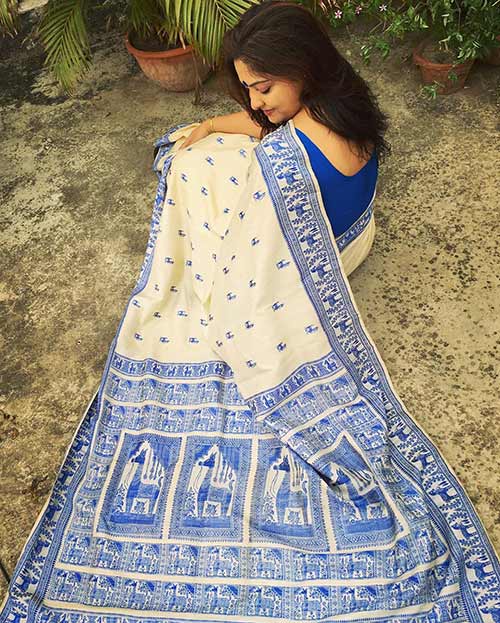
indian_on_indian_soil / Instagram
Baluchari sarees are handwoven using richly dyed silk, with intricate motifs depicting Indian mythology on the pallu. The designs usually depict stories from the Ramayana and Mahabharata, the most famous one being the story of Lord Krishna explaining the Bhagavad Gita to Arjuna.
Material: Silk and cotton
Originally from: Bishnupur, Balchur
Attire from: West Bengal
29. Kantha Saree
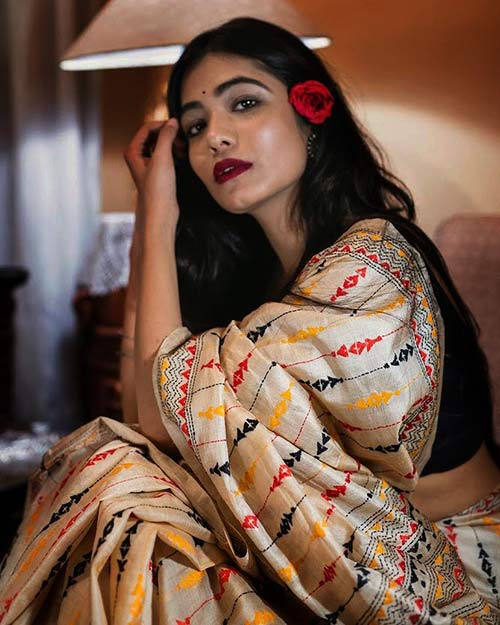
tasteofcalcutta / Instagram
The word kantha in Bengali means an ‘embroidered quilt.’ Initially used only on quilts, Kantha work is now done on sarees too. In spite of various developments, the embroidery continues to be done by the rural craftswomen of Bolpur, with the artform being passed down the generations over centuries.
Material: Silk, tussar silk, and cotton
Originally from: Bholpur, Birbhum
Attire from: West Bengal
30. Kota Saree
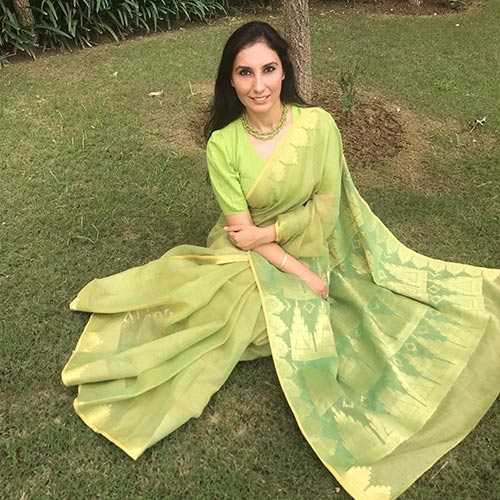
eeshitajoneja / Instagram
KotaDoria or Kotasareesare made of pure cotton and silk and have square like textures woven. The checkered pattern of Kota sarees makes them stand out distinctively. The sarees are vibrant and usually slightly sheer.
Material: Silk and cotton
Originally from: Kota, Mau, and Muhammadabad Gohna
Attire from: Rajasthan, Uttar Pradesh
31. Lehariya Saree
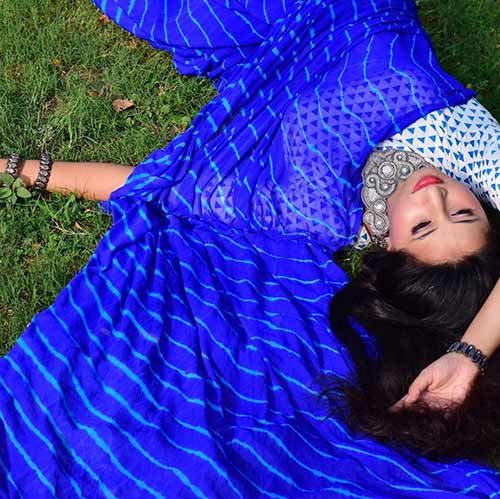
six_yards_of_bliss / Instagram
Lehariya sarees are made with a simple style of tie-and-dye. The term lehariya means ‘wave-like.’ It symbolizes the unique and rich heritage of Rajasthan. The lehariya pattern goes diagonally along the edges of the saree.
Material: Cotton, silk, chiffon, and georgette
Originally from: Udaipur
Attire from: Rajasthan
32. Bengal Tant Saree
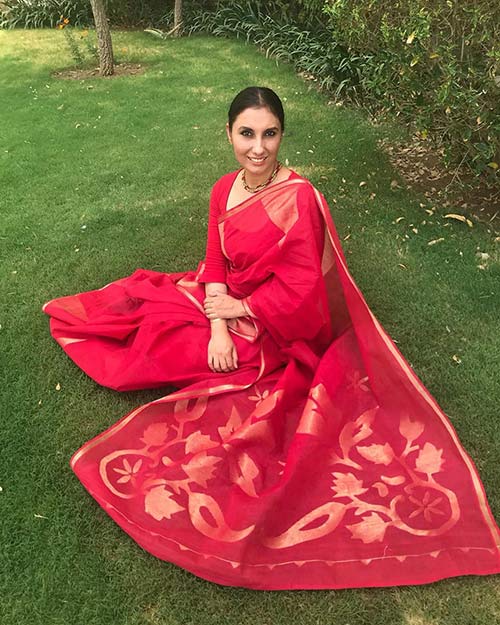
eeshitajoneja / Instagram
Tant sarees flourished during the Mughal era and are the most famous style of Bengali sarees in India even today. Tant sarees are woven from cotton threads and distinguished by their lightness and transparency.
Material: Cotton
Originally from:Dhaka, Tangail, Murshidabad, Hooghly, Nadia
Attire from: West Bengal, Bangladesh
33. Gota Saree
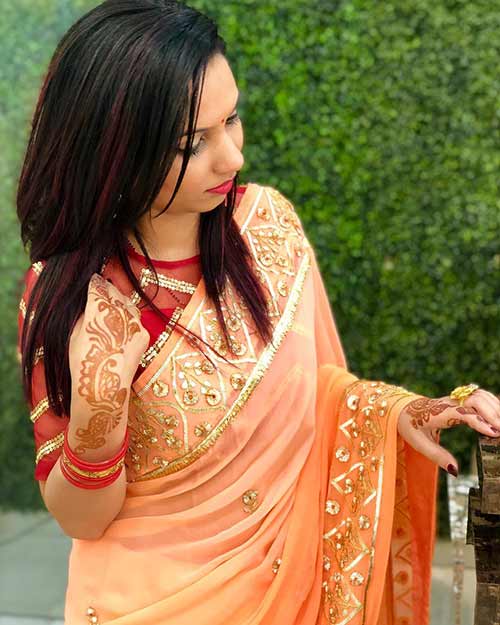
caracreationhifashionstudio / Instagram
The gota saree is created with the Gota Patti embroidery on the Gota fabric. Patterns are created using applique technique with metallic Gota fabrics like gold, silver, and copper. The Gota work enhances and adds glamor to the saree.
Material: Silk, cotton, and georgette
Originally from: Jaipur, Bikaner, Ajmer, Udaipur, and Kota
Attire from: Rajasthan
The way a saree falls and drapes depends on its fabric. And each fabric has its unique aesthetic. Check out the different types of saree fabrics in the next section.
Types Of Saree Fabrics
1. Cotton
Cotton sarees are light and summer-friendly. Cotton absorbs all kinds of moisture and sweat, thus making it one of the most comfortable fabrics for humid and hot weather. You can pick from pure cotton, linen, and khadi.
2. Silk
If you are looking for a saree for a festival or wedding, go for a silk saree. It is not only comfortable to wear during the summer, but it also keeps you warm during the winter. You can go for a Kanjeevaram or an Assam Silk saree.
3. Sheer Fabrics
Fabrics like chiffon, organza, and taffeta are sheer and see-through. They are lightweight and usually preferred for daily and casual use.
4. Synthetic Fabrics
Synthetic fabrics include nylon, polyester, and rayon. These fabrics are ideal for people who don’t wear sarees regularly. They are known for their lightweight yet soft and smooth texture, and they are low-maintenance.
5. Net
Net sarees have been trending for a couple of decades now. Net fabric is used to make gowns, skirts, tops, dupattas, and sarees. It can be embellished with rhinestones and bedazzled borders.
6. Fiber Cellulose Fabrics
Fiber cellulose fabrics are made from the bark, wood, or leaves of plants, or from other plant-based materials. For example, jute, linen, and certain types of silks are obtained from bamboo plants.
Now that you know all about the different types and fabrics of sarees, let’s dive into the latest sarees making the rounds right now.
Latest Saree Types In 2019
1. Belted Structure
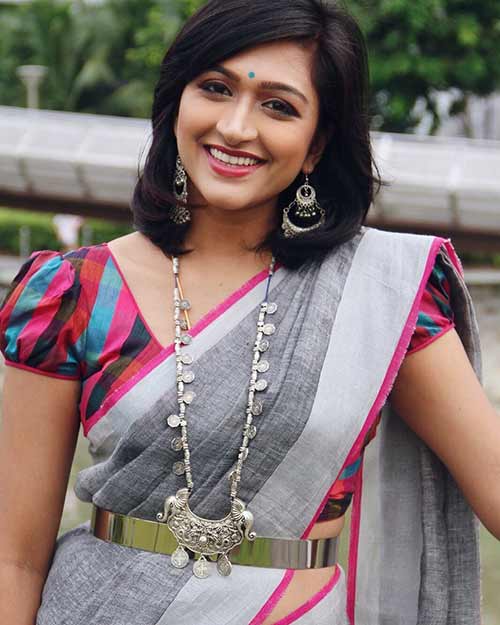
shanadramaqueen / Instagram
Belted sarees are a hot trend right now, and we are totally on board with it! The belt adds a structure and chicness to the ensemble. You can wear a sleek or a bold belt in leather, metal, or fabric over your saree for an instantly edgy party look.
2. Concept Sarees
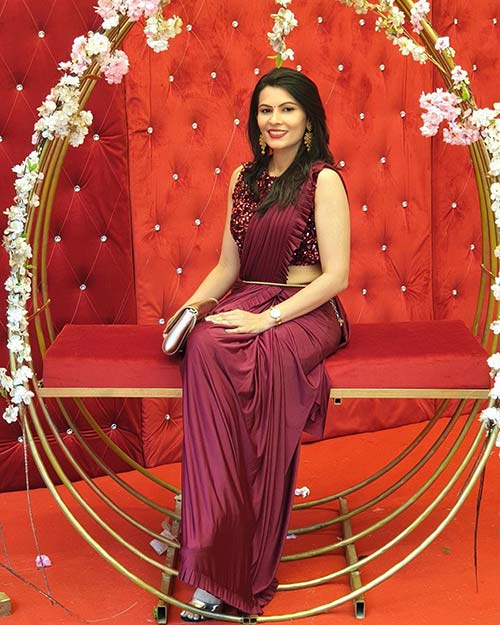
rakshitamaskeri / Instagram
Concept sarees include pre-stitched sarees, cape sarees, saree gowns, and dhoti or pant-style sarees. This new wave of contemporary fashion is taking over and making it easy for all the ladies to add a hint of edginess to their style.
3. Soft Pastels
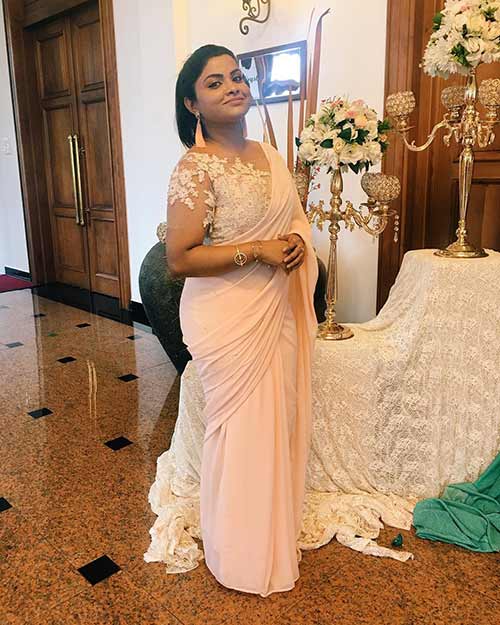
hashtagram_ / Instagram
Ditch the vibrant colors and opt for some pretty soft pastels. Pastel shades work for the day as well as for evening wear. Take your pick from peach, powder blue, blush pink, aqua, beige, and lilac.
4. It’s All In The Blouse
https://www.instagram.com/p/B0cr-nRFQYe/
A gorgeous blouse can up the oomph factor of your saree. With off-shoulder, cold-shoulder, criss-cross back, and every other style of blouse imaginable, the latest trends are setting some serious fashion goals. Make your blouse the highlight of your outfit to make the most basic saree look no less than a designer one.
5. High Neckline
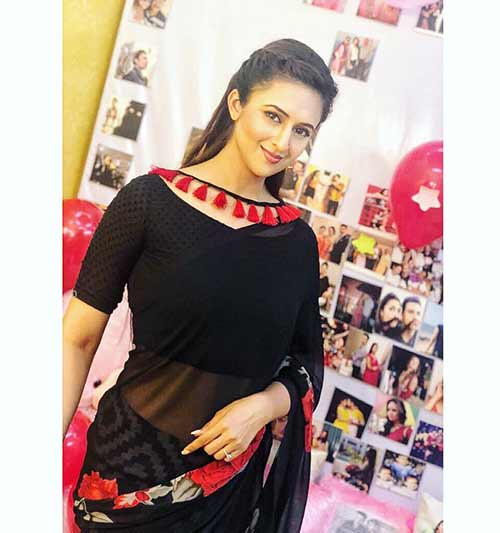
divyankatripathidahiya / Instagram
High-neck blouses are yet another trending blouse pattern. Ditch the usual deep U-neck blouses, and go for a stylish high-neck blouse. It adds a certain grace, elegance, and sophistication to the look.
6. Crystal Saree
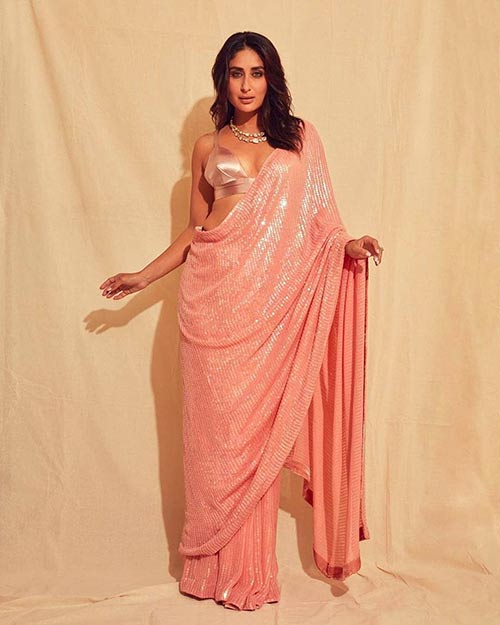
therealkareenakapoor / Instagram
Bollywood heroines love blingy crystal sarees that brighten up the room instantly. This is the perfect festive or party-wear saree that you can pair with an equally fancy blouse in a chic way. Style it right, and you will surely make some heads turn!
7. Appliquéd Net
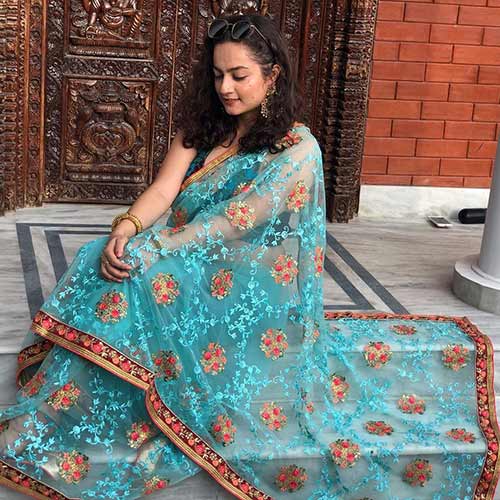
danphegirl / Instagram
Net sarees with appliqué work look simply stunning. The beautiful appliqués add charm and quirk to a plain and simple net saree. You can never go wrong with some floral appliqués!
8. Diamond Pattern
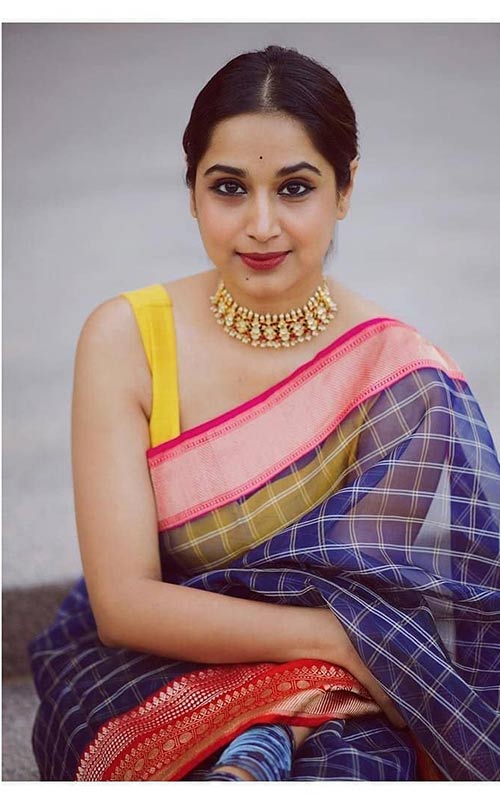
sareeinspirationn / Instagram
Diamond and checkered patterns are back with a bang! As much as these patterns look great on silk and cotton, they look even more fabulous on chiffon and crepe. Self-printed diamond patterns also look great when teamed with a fancy blouse.
9. Rich Velvet
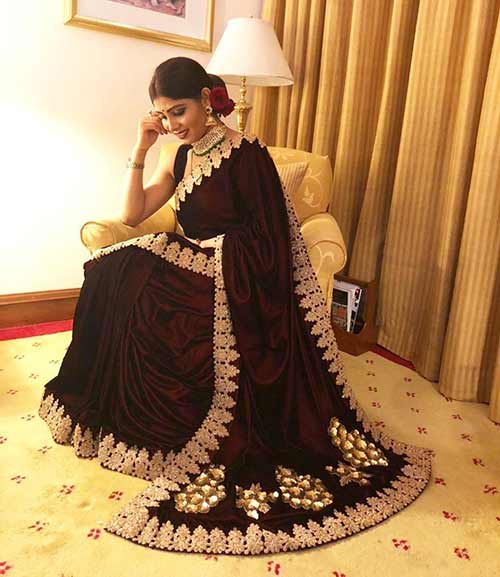
diptibharwanithelabel / Instagram
Ever since Anushka Sharma wore a deep wine-colored velvet saree to her engagement party, the velvet saree has taken over the fashion world. It not only looks regal and elegant but also classy in an understated way.
10. Contemporary Prints
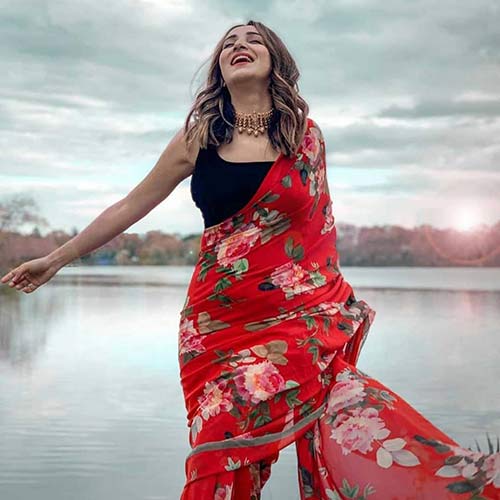
umaya.store / Instagram
Contemporary prints are a boon for all the fashionistas out there! Go for floral, chevron, or hound’s tooth print to add a touch of fun and quirkiness to your look. Pick them in offbeat and vibrant colors to finish off the look with perfection.
11. Thin Borders
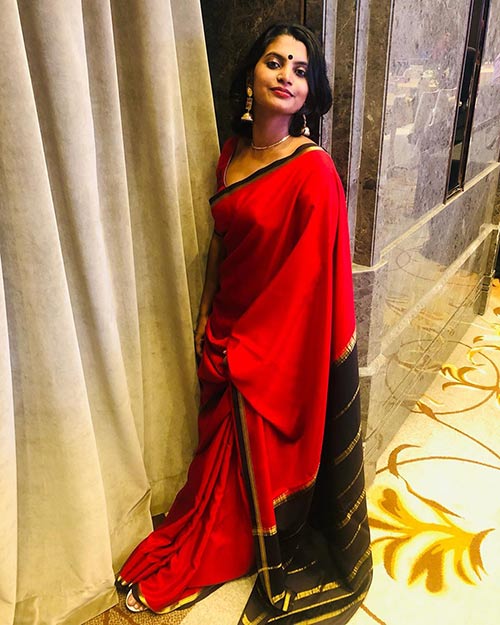
drama.rani / Instagram
Big and broad borders are outdated now. The current trend is all about minimalistic patterns and designs. Even the borders have narrowed down to thin and delicate ones. This keeps the saree looking simple and easy to pair with a heavy blouse.
12. Polka Dotted Saree
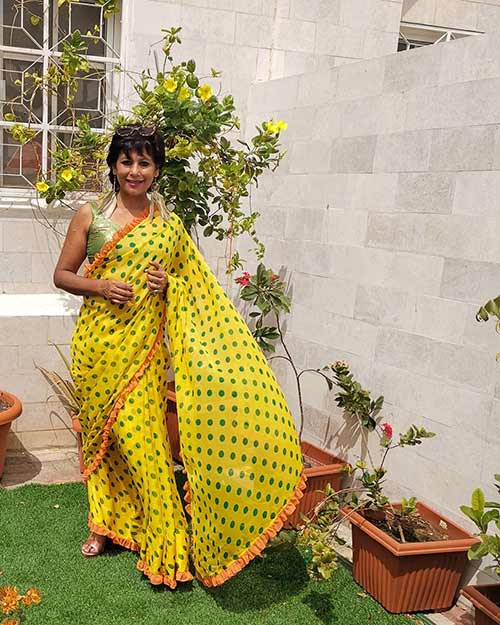
sushness / Instagram
Polka dots were all the rage in the ‘70s and ‘80s, and they look totally fun and quirky! Pick a polka dots saree in chiffon or organza that have a charm of their own.
13. Heavenly White
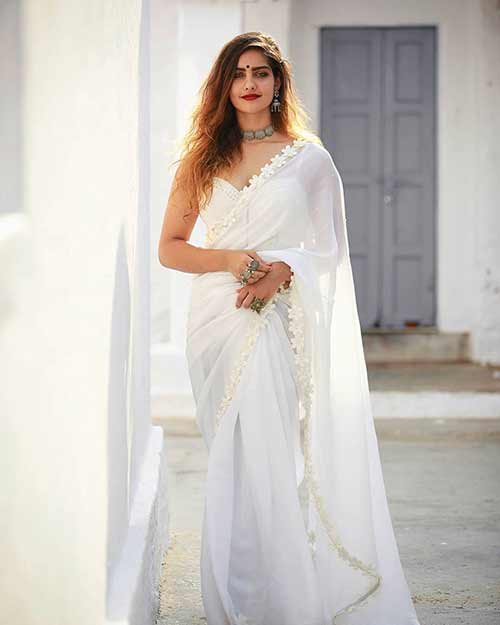
diksha04 / Instagram
If you think all-white sarees look dull and bland, you are wrong. The monochrome look of a heavenly white saree and blouse looks fabulous. Mix it up with different fabrics like lace, net, or chiffon to add depth to your look.
14. Solid Bubblegum Love
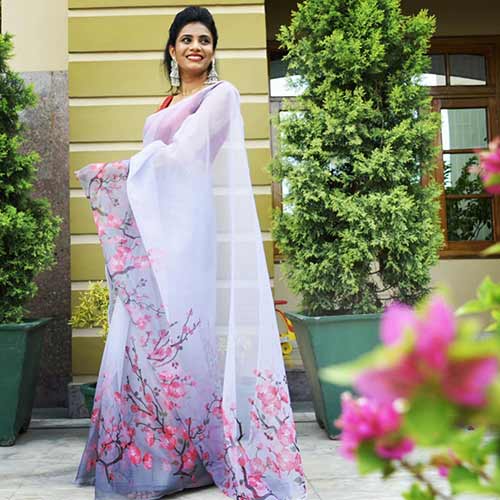
myolivetrunk / Instagram
Pastel shades of yellow, blue, and pink are known as bubblegum colors. These colors are soothing to the eyes and perfect for when you want to keep your look light and simple.
15. Midnight Copper
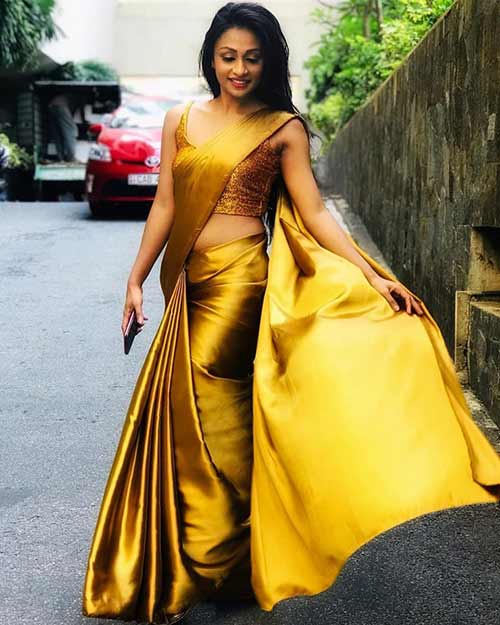
soyaa_di / Instagram
Metallic copper sarees look magnificent, and there are many chic ways to style them. From fancy belts to dramatic blouses, there are many elements that you can experiment with a copper-colored saree.
16. Maroon Strikes
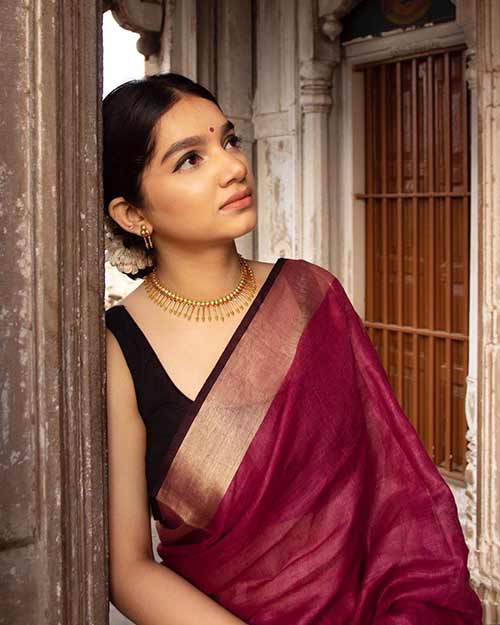
desidhaga / Instagram
The color maroon has so much depth and sheen to it that it suits everyone. Be it in silk, satin, or cotton, maroon looks equally magnificent in each one of them.
17. Subtle In Peach
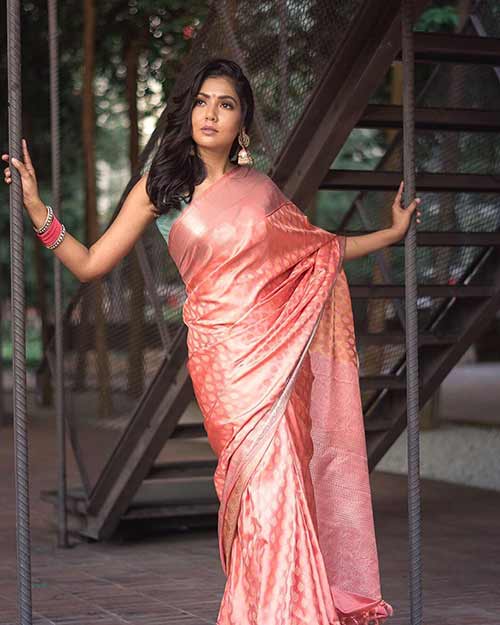
nithyaa_rv / Instagram
Peach is one color that has a subtleness and charm of its own. It looks great on every skin tone and can be styled easily. It is a pleasant color to wear during the day and at night for a party. You can jazz it up with a contrast blouse and statement jewelry.
18. Metallic Sheens
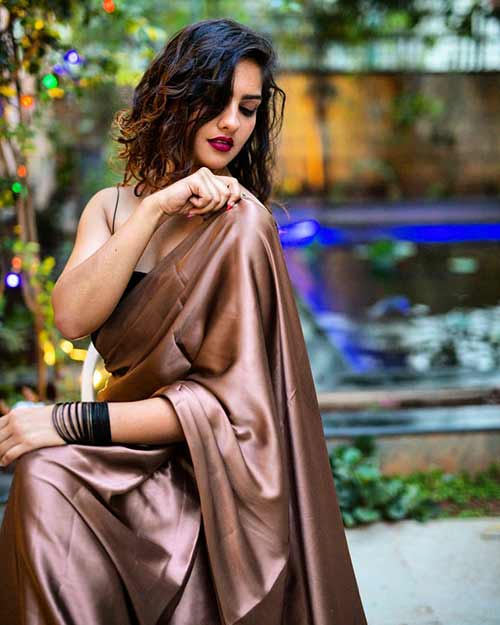
diksha04 / Instagram
Metallic sarees in silver, gold, or bronze can up your fashion game instantly. The fabulous shimmer and sheen of a metallic saree can amp up your fashionista vibe. Pair it with a halter-neck blouse and get ready to rock your world.
19. Keeping It Classic
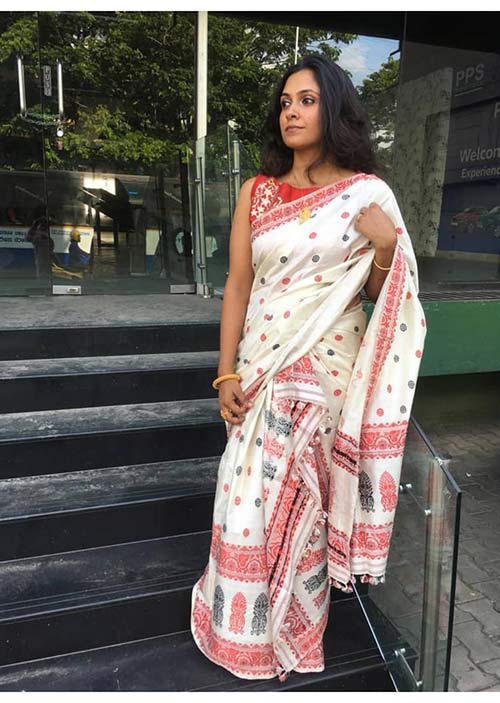
ofeliasarkar / Instagram
The classic red and white combination looks stunning even on a cotton saree. This combo is an integral part of the traditional Bengali saree and is perfect for a traditional function or festival.
20. Scribbled In Monochrome
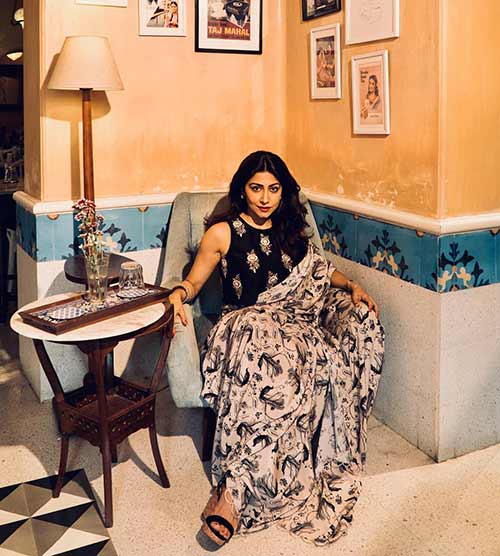
kanchan_wadi / Instagram
A chiffon or satin monochrome saree with abstract prints looks chic and modern. Style it with minimum accessories to keep the focus on the saree.
21. Silver Linings
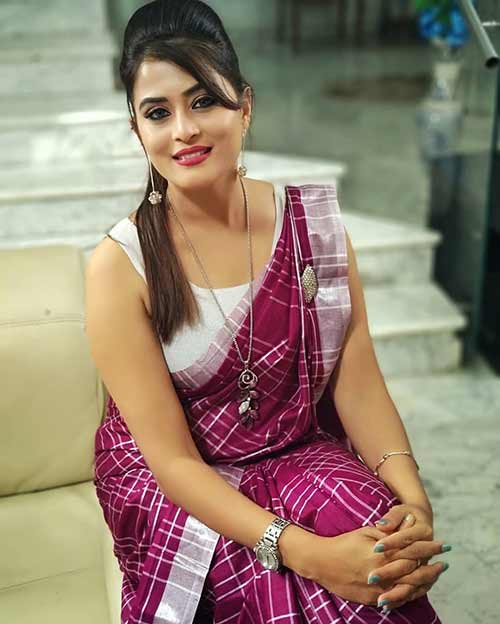
happy._.sh0pping / Instagram
Golden borders are cliché and common. A silver border adds a lovely appeal to the saree. Be it a pastel or a dark saree, it looks wonderful. Even rich Banarasi sarees often have a silver border to add a touch of grandeur to them.
22. Two-Piece Glamour
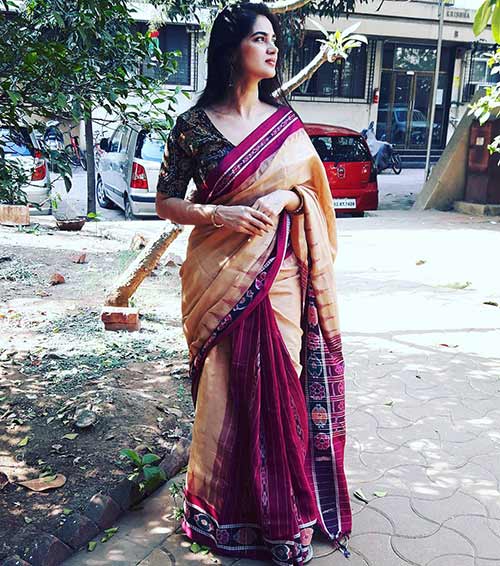
prreetii / Instagram
A patli pallu saree gives you the beauty of two lovely contrasting colors in a single saree. Patli pallu has one color on the body of the saree and a contrasting color on the pallu that create a beautiful ensemble.
23. Touch Of Uniqueness
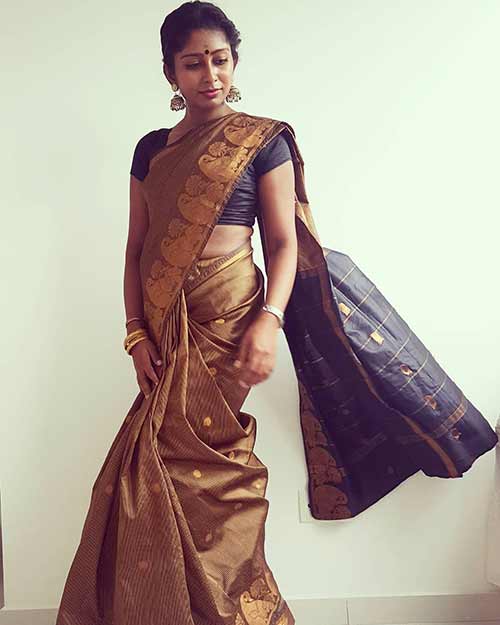
svassugi / Instagram
Copper or gold with black is a classic combination that can never go wrong! The vibrance and depth of gold is beautifully balanced with a solid black. Try it out, and you will fall in love with this unique combination.
24. Laced With Love
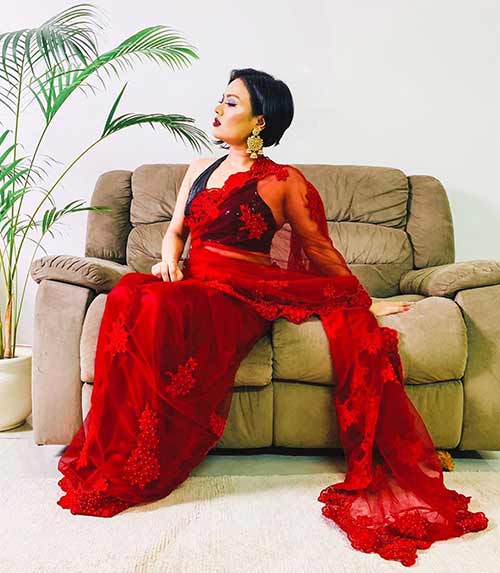
joyita.dey / Instagram
Lace is a delicate and sheer fabric that looks graceful and sexy at the same time! Trust us, this red lace saree will look no less than a showstopper at a party.
25. Being Modern
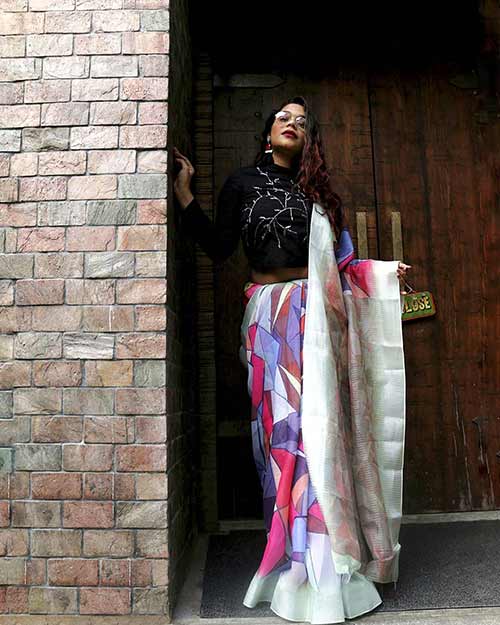
misspinkshoes26 / Instagram
Want to add a hint of chic modernness to your look? Try pairing a multicolored, abstract printed saree with an offbeat trendy blouse or crop top! You are bound to look like a million bucks.
26. Ethnic Conglomeration
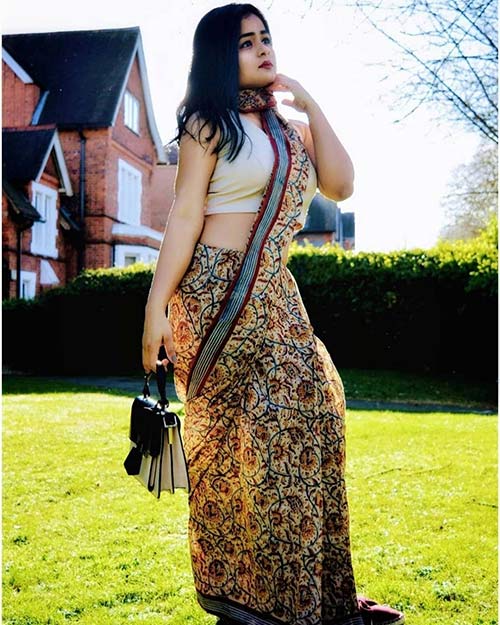
draped_in_dreams / Instagram
Though this saree has a traditional print, its draping style and texture are modern and edgy. It is a perfect fusion of tradition and trend. You can pair it up with a fancy crop top to create a fusion look.
27. Ombre Effect
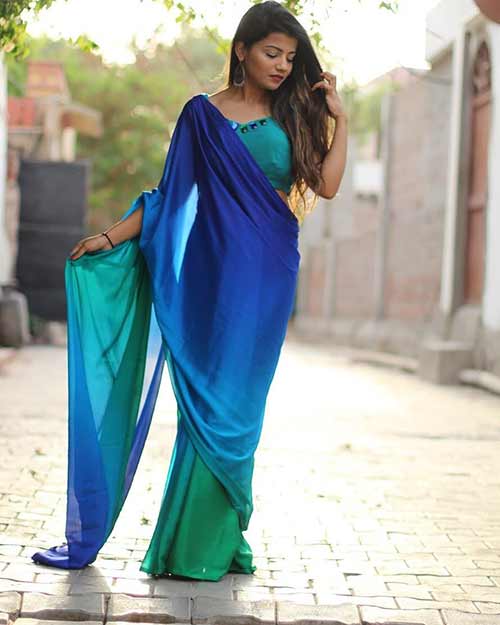
maisonshefali / Instagram
The ombre effect consists of a dark hue gradually fading into a lighter one. An ombre saree looks beautiful when draped and paired with a neutral or solid-colored blouse.
28. Colors of Joy
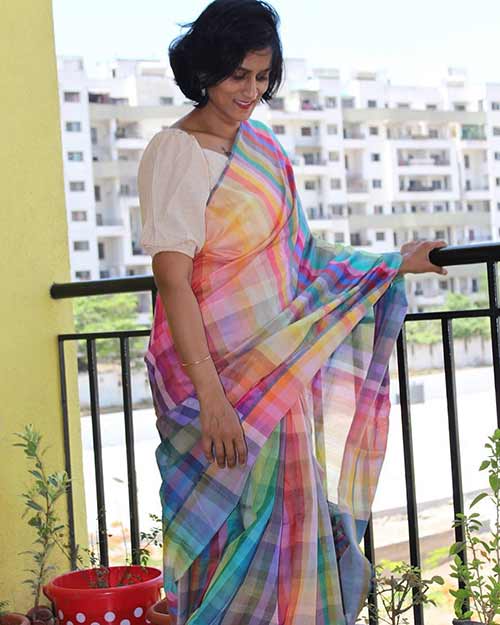
poonam_jaiprakash_khot / Instagram
There’s nothing more refreshing than a blast of vibrant colors. On the days when you can’t decide what to wear, this multicolored saree will come to your rescue. You can pair a blouse in literally any color with this saree.
29. Batik Love
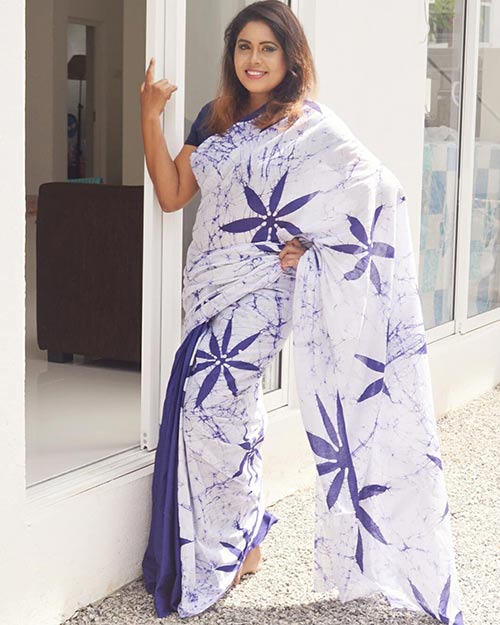
_anuradhika_ / Instagram
Batik is such an underrated art form, don’t you think? The urban edginess of a batik saree is irreplaceable. In spite of being a traditional style, a batik saree has a refreshingly modern feel to it.
30. Monochrome At Its Best
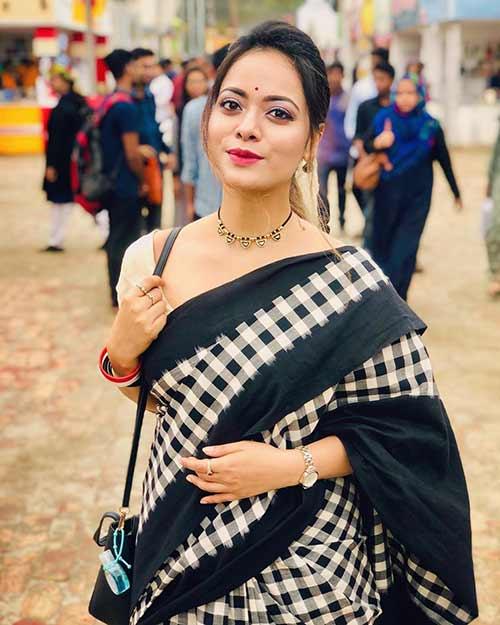
doctor.afrin / Instagram
The iconic chessboard checkered saree is something to die for! There’s a certain chicness and style to it that makes it stand out as a modern drape.
31. Pastel And Gold

silk.diaries / Instagram
The subtleness of pastels can be jazzed up with the bling of gold. Gold zari can add grace and elegance even to a plain off-white saree. It also helps restore the traditional feel of the saree instantly.
32. Glimmering Paradise
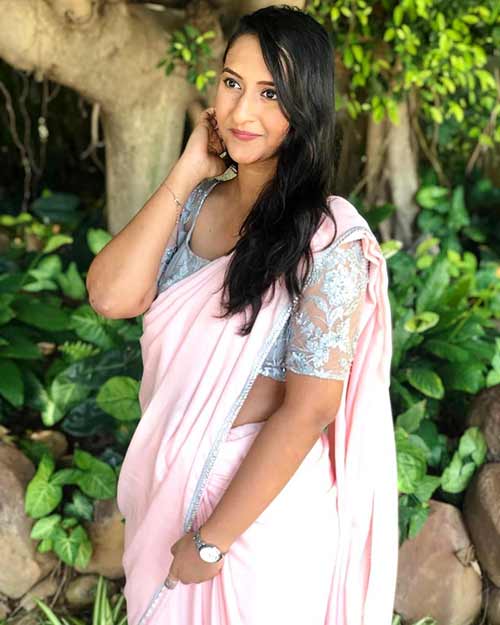
sush_couture / Instagram
Glimmering silver can jazz up a saree, too! A simple shimmery border or a glitzy blouse can add life to any dull saree. This makes for the perfect party outfit.
We hope we taught you something about the sarees from various states of India, their fabrics, and the latest trends. What is your dream saree? Comment below to let us know!
The post Different Types Of Sarees In India appeared first on STYLECRAZE.

2 Comments
ry
ReplyDeleteWonderful post! I have been looking for some gorgeous-looking Sarees Online. I will be searching for other Sarees as well such as Chiffon Saree, Ombre Saree & Shine Saree since I am shopping for my sister’s wedding.
ReplyDelete